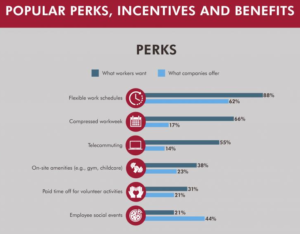When it comes to perks, there’s a big disconnect between what employees want and what employers offer.
With unemployment at nearly an all-time low, HR departments can expect a tougher battle for quality talent. One way to entice applicants is to offer perks that will differentiate your corporate culture from others who are competing locally for the same employee pool.
When designing perks, the biggest mistake employers make is assuming they know what their employees value most. There’s actually quite a disconnect between what employers think are good perks and what employees actually want, notes global HR giant Robert Half, which surveyed more than 1,500 employees and 600 HR managers about corporate culture and perks.
According to the survey, the top two employee desires are centered on scheduling: 88% wanted more flexible work schedules, while 66% would prefer a compressed workweek. While healthcare’s 24/7 operations may not be able to accommodate scheduling changes in traditional ways, creative approaches to staff scheduling—including shift-sharing options and holiday shift drawings—could go a long way in employee satisfaction.

Source: Robert Half, 2018
Other popular perks include workplace wellness programs, parking reimbursements, transportation contributions, onsite child care and concierge services.
While employees don’t care much about staff socials events, they do care about corporate culture—especially being part of problem-solving and decision-making and feeling like their views are being heard by superiors.
In short, perks aren’t really about adding a cappuccino machine in the staff kitchen, savvy employers say. Attractive perks are the non-compensation things that make employees’ lives easier and happier within the unique environment of your company.

